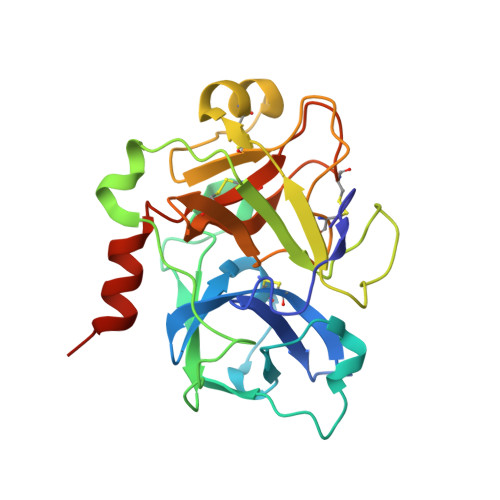Orally bioavailable pyridine and pyrimidine-based Factor XIa inhibitors: Discovery of the methyl N-phenyl carbamate P2 prime group
Corte, J.R., Fang, T., Pinto, D.J.P., Orwat, M.J., Han, W., Rendina, A.R., Luettgen, J.M., Rossi, K.A., Wei, A., Ramamurthy, V., Myers Jr., J.E., Sheriff, S., Narayanan, R., Harper, T., Zheng, J.J., Li, Y.-X., Seiffert, D.A., Wexler, R.R., Quan, M.L.(2016) Bioorg Med Chem 24: 2257-2272
- PubMed: 27073051
- DOI: https://doi.org/10.1016/j.bmc.2016.03.062
- Primary Citation of Related Structures:
5EXL, 5EXM, 5EXN - PubMed Abstract:
Pyridine-based Factor XIa (FXIa) inhibitor (S)-2 was optimized by modifying the P2 prime, P1, and scaffold regions. This work resulted in the discovery of the methyl N-phenyl carbamate P2 prime group which maintained FXIa activity, reduced the number of H-bond donors, and improved the physicochemical properties compared to the amino indazole P2 prime moiety. Compound (S)-17 was identified as a potent and selective FXIa inhibitor that was orally bioavailable. Replacement of the basic cyclohexyl methyl amine P1 in (S)-17 with the neutral p-chlorophenyltetrazole P1 resulted in the discovery of (S)-24 which showed a significant improvement in oral bioavailability compared to the previously reported imidazole (S)-23. Additional improvements in FXIa binding affinity, while maintaining oral bioavailability, was achieved by replacing the pyridine scaffold with either a regioisomeric pyridine or pyrimidine ring system.
Organizational Affiliation:
Bristol-Myers Squibb Company, Research and Development, P.O. Box 5400, Princeton, NJ 08543, United States. Electronic address: james.corte@bms.com.

















